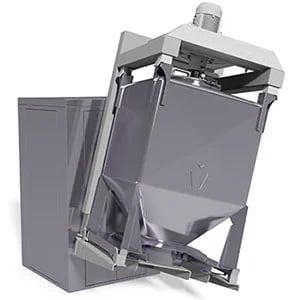When making the choice of which industrial mixer to select for your business it is important to consider the range of batch sizes you will be producing. We presume that the answer will be quite an assortment.
If you need the flexibility to handle smaller batches, then a cone screw blender or tumble blender will be the most suitable as they can still operate efficiently with low fill levels. Ribbon blenders normally need to be filled to 40-50% of the rated capacity. Here we advise you on the best, most flexible blending solution to suit your manufacturing needs.
Why is flexibility important when selecting an Industrial Mixer?
Generally, space in a factory comes at a premium, there is never enough space and you certainly don’t want to waste it. If you're blending to short order times you need to buy multiple industrial mixers to cover the range of batch sizes you produce, then these will all take up valuable room on the factory floor. Depending on the product you are producing, the industrial mixer may need to be housed in a 'clean room', which is expensive to construct and maintain. If you have multiple mixers then the costs of these 'clean rooms' spiral.
Another consideration to make is the amount of time your equipment is running. If you have a range of mixers, are they all working during a shift or are some of your assets sitting idle? For more information on cost saving, read our previous blog: 'How to Save Millions by Tweaking Your Industrial Mixer'.
A simple route to flexibility with your powder blending
A Matcon IBC blender offers a huge amount of flexibility to the blending capabilities. Firstly, the Matcon IBCs are available from 200L to 3,500L. All of these can fit on the one blender as the double jacking clamping mechanism and spacer framework keep the IBC in the optimum position for blending.
Secondly, a single IBC can be loaded to a percentage of the rated capacity. When this is added to the volume of the IBC the capabilities of the single blender become multiplied.
Space-saving equipment options
 Because the IBC becomes the blending vessel itself there is no product contact with the blender. This means that changeovers can be instantaneous as there is no downtime for cleaning. This results in the ability to blend up to 4 batches per hour from a single blender, which compares favorably to a fixed mixer that needs a full clean down every batch change.
Because the IBC becomes the blending vessel itself there is no product contact with the blender. This means that changeovers can be instantaneous as there is no downtime for cleaning. This results in the ability to blend up to 4 batches per hour from a single blender, which compares favorably to a fixed mixer that needs a full clean down every batch change.
Allied to the fact that a range of IBC sizes can be accommodated on one blender, it might be that a single Matcon IBC blender is all that you need. What a saving that would be on space and any clean room costs you might have.
Getting it right for you
Our team of engineers will be able to determine the optimum fill levels and size the IBCs correctly to match your throughput requirements, whilst taking into account your product’s initial and post-blend bulk density.
We encourage our customers to visit our full-scale Testing facilities to perform blending trials with their own powders, to give them confidence when placing their capital investment.
We are able to establish that a blend is homogenous and the blend times needed for each recipe by using NIR (near infrared spectroscopy) as part of the trial. NIR can give real-time feedback and removes the need for invasive sampling, which can be prone to error.
Click the link below to download the helpful checklist on which industrial mixer is the best choice for your manufacturing facility.

